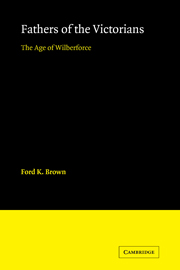Book contents
- Frontmatter
- Contents
- Dedication
- Foreword
- PART I WAR ON THE GENTILE WORLD
- 1 Fat Bulls of Bashan
- 2 The Moses of the Israelites, a Courtier of Pharaoh
- 3 Disciples in Caesar's Household
- 4 Citizenship in Heaven
- 5 Sennacherib's Army: The Rally round the Alter
- PART II LABOURING FOR THE SPIRITUAL IMPROVEMENT OF OTHERS
- PART III ENGLAND IN DANGER
- Bibliography
- Index
3 - Disciples in Caesar's Household
Published online by Cambridge University Press: 11 March 2010
- Frontmatter
- Contents
- Dedication
- Foreword
- PART I WAR ON THE GENTILE WORLD
- 1 Fat Bulls of Bashan
- 2 The Moses of the Israelites, a Courtier of Pharaoh
- 3 Disciples in Caesar's Household
- 4 Citizenship in Heaven
- 5 Sennacherib's Army: The Rally round the Alter
- PART II LABOURING FOR THE SPIRITUAL IMPROVEMENT OF OTHERS
- PART III ENGLAND IN DANGER
- Bibliography
- Index
Summary
The close of the eighteenth century witnessed the rise of that spirit that has given birth to all those noble institutions that have been ever since increasing in number, magnitude, and vigour, and are now scattering the seeds of eternal life throughout the world.
the reverend william goode, jnr., 1828He attached himself to most of the religious and philanthropic societies of his age, that he might enlist them as associates, more or less declared, in his holy war.
sir james stephenOne thing must always be taken for granted respecting these people,–that is, wherever they gain a footing, or whatever be the institutions to which they give birth, proselyting will be their main object; every thing else is a mere instrument–this is their principal aim.
The Edinburgh Review, 1808The Duchess Dowager of Beaufort, with her usual kindness to me said, if I wished it, she would certainly sign; otherwise she thought such an old woman could add no credit to it; but I suggested that her high rank might attract others.
hannah more, I799I trust Lady — will be a confirmed and exemplary Christian. Her rank, her vast fortune, her fascinating manners, sweet person, and engaging understanding, will serve to recommend religion to those who will not swallow the pill till it is covered with much leaf gold.
hannah more, 1813In the Society to Effect the Enforcement of His Majesty's Proclamation Against Vice and Immorality (1788), known as the Proclamation Society, Wilberforce struck on only a small part of the canonical pattern of the Evangelical moral institutions that in a few years were to cover England.
- Type
- Chapter
- Information
- Fathers of the VictoriansThe Age of Wilberforce, pp. 83 - 122Publisher: Cambridge University PressPrint publication year: 1961



